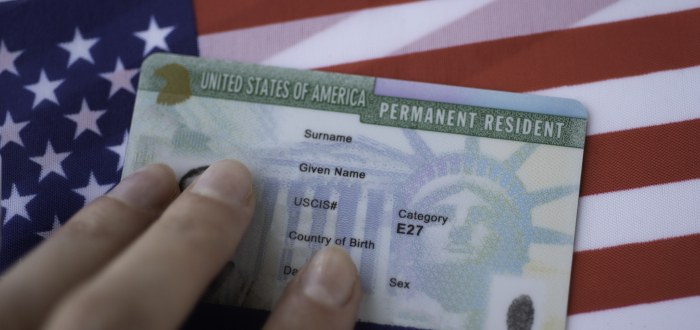Obtaining permanent residency in the United States is a common aspiration for many immigrants. Several legal routes can lead to a green card, whether you’re seeking to reunite with family, advance your career, or find safety and security. The U.S. immigration system offers different opportunities, including family-based petitions and employment-based categories. We will explore each pathway and guide you through the eligibility criteria, application processes, and what it takes to secure your place in this diverse nation.
What Is a Green Card?
A green card, formally known as a Permanent Resident Card, is an identification document that signifies a person’s status as a lawful permanent resident (LPR) of the United States. Holding a green card allows individuals to live and work permanently in the U.S., travel abroad, and later apply for U.S. citizenship if eligible. Green card holders must meet specific obligations, like maintaining continuous residency and renewing their cards every ten years. It offers stability and the opportunity to build a long-term future in the U.S. while enjoying certain protections and rights.
Family-Based Green Cards
Family-based green cards provide a pathway to permanent residency for individuals with close relatives who are U.S. citizens or permanent residents. Immediate relatives, like spouses, unmarried children under 21, and parents of U.S. citizens, receive special priority. Their applications generally face no annual limits, resulting in shorter processing times.
Other family members, including siblings of adult U.S. citizens and married children of citizens, fall under family preference categories with numerical limitations, creating longer waits due to high demand. These categories also encompass spouses and unmarried children of permanent residents.
To petition for a family member, a U.S. citizen or permanent resident must file Form I-130 (Petition for Alien Relative). Once approved, the petition allows the family member to apply for a visa or adjust their status if they are already in the U.S. Processing times can vary based on category and the applicant’s home country. The family-based process emphasizes reunification, keeping loved ones together.
Employment-Based Green Cards
Employment-based green cards are available to individuals who possess unique skills, qualifications, or investments that benefit the U.S. economy. These green cards fall under five preference categories, each tailored to different types of professionals.
- EB-1: Prioritizes individuals with extraordinary abilities in the arts, sciences, education, business, or athletics; outstanding professors and researchers; and multinational executives and managers.
- EB-2: Includes professionals holding advanced degrees and individuals with exceptional abilities in their fields. Some may need a labor certification.
- EB-3: Covers skilled workers with at least two years of experience, professionals with bachelor’s degrees, and certain unskilled workers. A labor certification is usually required.
- EB-4: Accommodates special immigrants like religious workers, international broadcasters, and certain juveniles.
- EB-5: Targets investors who contribute significant capital to a business venture that creates or preserves jobs.
Each category has unique criteria and processes involving factors like labor certification, priority dates, and specific qualifications.
Diversity Visa Lottery
The Diversity Visa Lottery is an annual program that promotes diversity in U.S. immigration. Every year, up to 50,000 visas are allocated to individuals from countries with historically low immigration rates to the United States. Applicants must meet basic educational or work requirements and come from eligible nations. The selection process is random, but being chosen in the lottery doesn’t guarantee a visa. Selected individuals must pass further eligibility screenings before securing their green card. Despite the challenging odds, the lottery offers a unique opportunity for those seeking permanent residency.
Special Immigrant Categories
Special immigrant categories offer unique paths to permanent residency for specific groups facing special circumstances. This includes religious workers who provide essential services for non-profit religious organizations. International broadcasters, given their contribution to U.S. international broadcasting efforts, also fall under this category.
Certain juveniles qualify through the Special Immigrant Juvenile (SIJ) status if they cannot reunite with their families due to abuse, neglect, or abandonment. Other special immigrants include Afghan and Iraqi translators who worked with the U.S. government, retirees of international organizations, and certain NATO personnel.
Each category has specific eligibility criteria, often requiring documentation proving one’s unique status. These special immigrants can petition for a green card by filing Form I-360, though some may face numerical limits or additional requirements. Regardless, these pathways offer much-needed support to individuals who have contributed to or have special ties with the United States.
Humanitarian Programs
Humanitarian programs like Temporary Protected Status (TPS) and Deferred Action for Childhood Arrivals (DACA) provide relief for immigrants facing unique challenges. TPS offers temporary protection and work authorization to individuals from countries plagued by conflict, disaster, or other extraordinary conditions. DACA, meanwhile, benefits eligible undocumented individuals brought to the U.S. as children, protecting them from deportation and allowing them to work.
While these programs offer temporary protection, they can also serve as stepping stones toward more permanent status. Understanding their eligibility criteria and application processes can help those in need find a secure foothold in the U.S.
Contact an Experienced Green Card Attorney
At the Rahimi Law Firm, P.C., we understand the challenges of securing a green card and are committed to guiding you through the complexities of each pathway. Whether it’s family reunification, employment opportunities, or special immigration status, we’ll provide personalized advice to help you achieve your goals. Contact us today for a consultation, and let’s explore the best path toward securing your green card.
